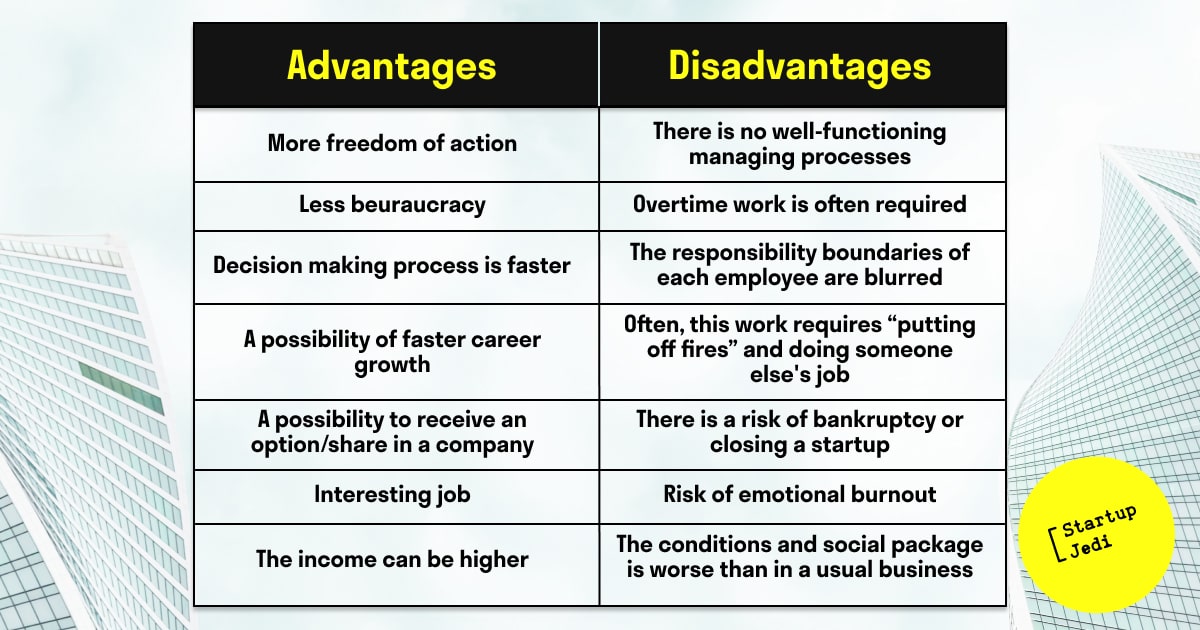
Startup Jedi
We talk to startups and investors, you get the value.

Startup Jedi
We talk to startups and investors, you get the value.
When it comes to startupі, most people imagine scenes from "The Social Network" or "Silicon Valley" TV series: ingenious and resourceful programmers, an office in a house with its own pool, millions of investments, luxurious parties, etc. And an experienced entrepreneur shudders and imagines endless tables with unit-economy, liters of coffee and the first gray hair. How does a career in the venture business look like and how to progress in a startup? Let's find out right now!

The absence of strict hierarchy: usually, in a startup everybody is on first-name terms; there are no various management levels and there is no difficulty to get an appointment with a CEO of the company (at early stages, the CEO often works with you in one team).
Working speed: speed is the main competitive advantage and it defines the pledge of startup’s survival. Thus, all the decisions, plan changes and product updates are done at the top speed.
Interesting and unusual work: a startup doesn't just sell a product to a user, it offers an innovative solution. It’s not a coincidence that the phrase “We want to make the world a better place” is the unofficial credo of all (or almost all) startups in the world. Working at a startup can definitely be the kind of work that makes you want to get up in the morning and the one you don't want to run away from on Friday night by turning off your phone.
No bureaucracy: usually, startups are created by people who hate bureaucracy and useless work, so great ideas aren’t drowning in paperwork and in the need to have approval from all bosses.
Easier to grow: a successful startup grows fast. At the stage of launch and first sales, you can work in a team of 10 people in a cozy office and after six months, you can be a part of a company with 500 employees and manage one of the departments. Of course, in a common company, you can also climb the career ladder, but there, in addition to talent and hard work, you will need a fortunate combination of circumstances: for one of the managers to quit or move higher, freeing up a position for you.
Higher income: usually, in startups, each employee has a bonus part, which depends on the company's growth indicators, and key employees receive options. But this applies to startups in mature stages, in the days of Pre-seed and Seed stages it is vice versa: there is not enough money.
To make it more clear, here are the advantages and disadvantages of work in startups in comparison to work in a commercial company.


Working in a startup at early stages is a perfect fit for people whose motto is "Nothing ventured, nothing gained"
On the one hand, people are usually reluctant to invest in startups at the stages of searching and testing ideas: during this period, the team most often lives on the founders' money, investments come by the “friends, family, fools” formula and enthusiasm (and sometimes on instant noodles). And even if you already have a proven product market fit and started the first sales, resources will still be desperately lacking until a large investor appears.
On the other hand, if the company's product passes market validation, the first employees get everything, like the winners from the ABBA song. High salary, options, personal office and very fast career growth. 70% of top managers in startups come from the original team, which was formed at an early stage. Only in a startup, an ordinary specialist can become a vice president of an international company a year later; in a traditional business, such a career path will take 10-20 years.
Is it worth putting the stage on black and joining a startup at the Seed stage? Everyone has to decide for themselves, but one thing is definitely true: you must believe in this product and desire to work with it for the next 10 years. Without this faith, there will definitely not be any rapid career growth, nor the startup itself.
“If you believe in something, work nights and weekends, it won’t feel like work.” — notes Kevin Rose, the co-founder of Digg.
If you got inspired by this quote and ready to head into adventures, here is the list of things you will face when you will work in startups at early stages.
Working directly with product development: there will be a lot of creativity and less performance, and many solutions you will make jointly with founders.
Working as a "universal soldier". In a small team, everyone picks up each other's tasks, solves problems together, and closes pending tasks.
Irregular schedule and high level of responsibility.
Working in a highly uncertain environment: often you won’t have enough data, and you will literally invent solutions to certain problems on the spot.
Rapid growth: both career and personal. In the work process, you will have to learn on the go and from your own mistakes, and with the constant smell of burning deadlines. It may not be the most comfortable, but extremely effective way to learn.
High risks: this is the very stage where a startup can get into the "valley of death": freeze with a small number of sales, insufficient for rapid growth.
Quickly react to changes: actually, this is the key skill without which a startup won’t be able to grow and get to the next level.
Some may consider these work features as disadvantages, while others may only dream of such creative work and testing themselves a bit; otherwise, we wouldn’t have so many startups, and the number of “unicorns” wouldn’t grow every year.

To be in the founders’ team. This is the easiest and most common way, when each of the co-founders eventually becomes the head of his department. However, it is better to remember that working under stress on a product, when you can “kill it” by using your skills and ingenuity is one thing, but leading a team of professionals is quite another. Here you need to develop the skills of a leader, manager and a bit of an inspirer.
Come to solve startup’s problems. Most often this happens during the product scaling phase (rounds A, B, C). A startup is turning into a big company, and in order not to break down and drown in the operating system, the company invites professional managers to the team. They help to rebuild certain processes: document flow, work with personnel, etc.
Due to the company's scaling. In the process of growth, new departments are formed in the company and they need people to head them. Another option is to enter the international market. At this level, the team is replenished by team leaders, heads of departments and project managers.
Replace founders in a specific work direction. With the company growing, the founders retain the strategic functions, and the operational management is given to a professional manager. Sometimes companies invite a hired employee to the chief executive team at the request of investors.

Being a good field specialist meaning being not only a good manager and appoint tasks but know how to “work manually” and know your field from A to Z to make the right decisions.
Possess agile planning techniques: speed remains a necessary advantage for a startup at any stage.
Ability to make decisions in the face of uncertainty is the #1 skill for anyone in a leadership position at a startup.
Have high self-discipline: it is important to work for the result, in case of force majeure — do not give up and work until the problem is solved.
Quickly analyze feedback and implement changes, especially in those departments that are directly working on the product.
Have good leadership skills and high emotional intelligence: working in a startup is fun but often challenging. So to avoid employees burning out and not losing heart in difficult moments, you need to be able to inspire them, choose the right words, and listen to their opinions.

Give heart to what you do. Working in a startup is always fraught with risks, force-majeures, overtimes, so without sincere love for the company product, it is unlikely that it will be possible to work fruitfully in such conditions.
Implementing improvements. The desire to optimize work, come up with and implement improvements is very much appreciated in startups. Don't be afraid to be proactive and suggest changes. At the same time, try not only to draw the manager's attention to the fact that it is necessary to "fix this and that", but justify your proposal with real numbers, offer a clear plan of action. Then they will see the makings of a leader in you.
Take an interest in the work of other departments. Don’t limit yourself to your work field: find out what they are doing in other departments, what problems and tasks they have. This will help build a systematic view of the company's work as a single mechanism. Besides, this is a reason for networking!
Result-oriented. There are two approaches to work: to go and do as you were told (and "freeze" when the instruction didn’t work), or independently look for a path that will lead to a desired result. Can you guess which working approach is valued in startups?
Constant learning. A person with the potential of a leader is distinguished by curiosity, a desire to understand problems and replenish their knowledge. Working in a startup, especially in leadership positions, is an ongoing learning experience.
Implement projects. If you want to grow to a head of department in a startup but you don't have a proven experience, try developing and implementing your own small project. Come up with a cool feature for a product or a project for colleagues, share the idea with the manager, ask him to become your mentor during the implementation of the project. This is the best way to gain managerial experience: on the one hand, you are in charge of your own project, on the other, you are always backed up by a mentor.
We hope that this tutorial will help you to objectively look at the different sides of working in a startup. This job is completely different from a quiet, calm activity somewhere in a pretty office, with the end of the day at 6:00 pm and a guaranteed vacation at sea. Still, working at a startup is one of the few ways to get your dream job and live a life that you definitely won't regret.
Choose with your heart but first make sure to read this article carefully!
Facebook: facebook.com/StartupJedi/
Telegram: t.me/Startup_Jedi
Twitter: twitter.com/startup_jedi
Comments